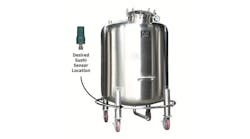Are you interested in buying two dozen unused Beta video cassettes? Im getting to the point where I dont use my Betamax video recorder much anymore. Its not that Ive finally gone over to the rival VHS format. Ive long had a VHS video recorder, used primarily to play movie rentals, to supplement the Betamax. The real reason is that Im increasingly turning to DVDs instead of either tape format.
If you dont remember the video format war, it started in the mid-1970s. Sony introduced Betamax and a year or so later JVC launched VHS. Major manufacturers took sides, offering video recorders only in a favored format. The result less choice and more confusion.
Ultimately, VHS won out. Books have been written on why, citing issues such as the differences in maximum recording times possible with the formats. Once VHS started to predominate at video rental stores in the 1980s, the market share of Betamax quickly shrank.
Fast forward to the 1990s. Control system vendors engaged in the so-called Fieldbus Wars, with opposing camps adamantly promoting different approaches. By the end of the 1990s, a compromise was reached via a standard that basically encompassed the two main contenders Foundation Fieldbus and Profibus. Since then, the installation of both major variants of fieldbus has continued to grow strongly.
Skirmishes over fieldbus continue, though, lately focused on the use Electronic Device Description Language (EDDL) versus Field Device Tool/Device Type Manager (FDT/DTM). If youd like get a sense of what the fuss is all about, check a recent column (http://www.controlglobal.com/articles/2006/027.html) by Ian Verhappen, a contributing editor at our sister publication Control and the author of an article on fieldbus scheduled for next months CP.
These battles came to mind early last month while I was attending ABB Automation World, which drew 2,500 people to Houston.
My thoughts turned to them specifically during a session in which Sean Keeping, vice president of technology for instrumentation for ABB in St. Neots, U.K., demonstrated the potential of wireless technology. He used it to monitor from Houston in real-time the water consumption at a hotel in Dubai, U.A.E., and to show how to simplify pH measurements from a physically awkward location at a plant. However, his obvious enthusiasm for wireless technology was tempered by concern that two emerging standards from the SP100 Committee of ISA, Research Triangle Park, N.C., and the 802.11 Working Group of I.E.E.E., New York City might hamper wireless success. ABB itself, he stressed, is actively participating in the two efforts and is striving to ensure that both organizations settle on the same standard, but nothing is certain at this point.
With the increasing interest in using wireless at plants (p. 38) comes an increasing need to efficiently integrate disparate devices. This requires a sensible approach to standards (see CP, March, p. 51). Users will benefit, and so, too, will vendors. As Bob Hausler, ABBs Warminster, Pa.-based vice president of marketing for instrumentation, succinctly said at the end of the session: ABB would much rather devote its resources to developing new products rather than to supporting two conflicting standards.
The chemical industry should heed that message and press with all its power for a uniform standard. Wireless is potentially too important to our plants to allow it to get tangled by a standards war.

